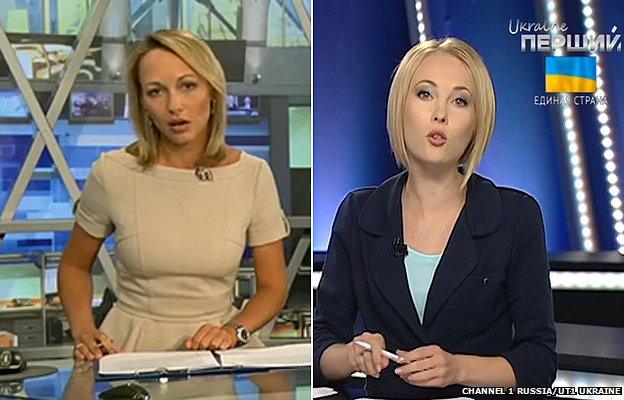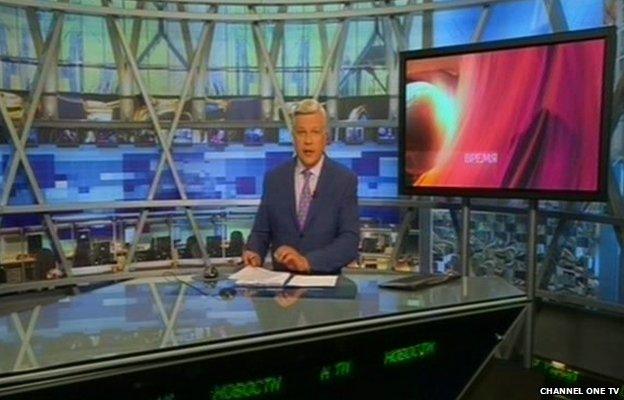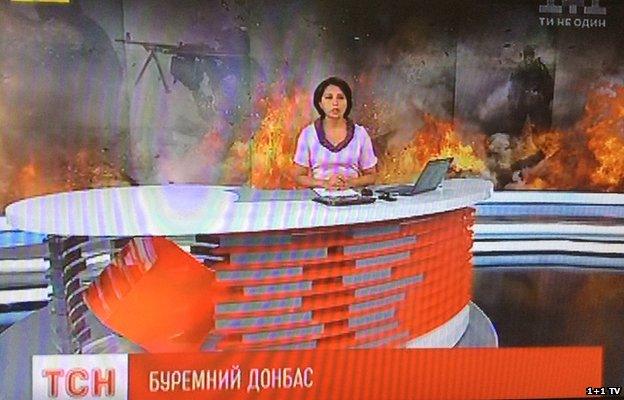Ukraine conflict: Turning up the TV heat
- Published

Presenters from Channel One Russia (L) and Channel One Ukraine
Television channels in Russia and Ukraine are using emotive language in their coverage of the conflict in the east of Ukraine, with Moscow-based channels employing particularly strong terms to compare Ukrainian authorities with Nazism.
Russian state TV's coverage of the crisis has been consistently sensationalist, using a wide repertoire of propaganda techniques to incite revulsion and hostility towards the authorities in Kiev.
Television in Ukraine has fastened on the role of the Kremlin and decries Russian media "lies", though with less emotive language than Moscow-based channels.
'Fascists'
A constant refrain of Russian TV's reporting of the Ukraine crisis has been its attempts to equate the current authorities in Kiev and their supporters with fascists.
One of the ways they have done this is to brand them as banderovtsy, followers of controversial Ukrainian nationalist and wartime partisan leader Stepan Bandera.

Russia's Channel One has consistently used extreme language to demonise Ukraine
Bandera was demonised by the Soviets and still is by Vladimir Putin's Kremlin as a Nazi collaborator, but is revered as a hero in parts of Ukraine.
The word junta is often used on Russian television to describe the Ukrainian government, suggesting a lack of legitimacy following the ouster of pro-Russian President Viktor Yanukovych in February.
More emotive is the use of the words "fascist" and "Nazi" in many Russian TV reports. They are words used in several contexts, from portraying the far-right Right Sector as Ukraine's real driving political force, to drawing parallels with World War Two.
Russian state TV widely uses the term "punitive operation" when referring to Ukraine's security operation in the east.
The term, which normally refers to wartime German reprisals on Soviet territory, was first heard during a speech by Mr Putin on state TV in March, in which he said that supporters of Mr Yanukovych were being threatened by "repressions and punitive operations".
Russia's state channels Rossiya 1, external and Channel One, external have each used the term in more than 500 reports, and the word "punishers" more than 100. Their use is not universal, however. Gazprom-owned NTV , externalhas used the term sparingly, and has never used "punishers".
'Killed by Russia'
In Ukrainian newscasts, stories about Russia portray the country in a negative light but language has been restrained in comparison to that on Russian TV. There has also been mild criticism of the country's military commanders.

Ukrainian channels like 1+1 TV have mixed dramatic imagery with more restrained language
Coverage has evolved in recent days from suggestions of Russian involvement to direct accusations. Russian forces, which were previously described as "someone helping from the neighbouring state", are now openly accused of taking part in the fighting. According to one report on the 1+1 channel, Ukrainians "are being killed not only by terrorists, but also by Russia".
Pro-Russian separatists are routinely referred to as "terrorists" as Ukrainian channels follow the government line, irrespective of ownership or leaning.
Much Ukrainian coverage has been devoted to accounts of torture and kidnapping by pro-Russian fighters, and rebutting what it calls Russian media "lies" about the Ukrainian government's self-declared "anti-terrorist operation".
If the Russian stance on any issue is mentioned, it is invariably dismissed as "Kremlin propaganda" with Oleksandr Dubynskyy, a journalist working for Ukrainian 1+1 TV, referring to the Russian pro-Kremlin LifeNews, external rolling news channel as "liars and scoundrels".
Stronger editorial criticism of the Russian authorities can be seen away from news broadcasts, with documentaries and live discussion programmes promoting strong anti-Moscow views, and it is on live talk shows where the most outspoken views on Russia are heard.
The Freedom of Speech programme on ICTV, external and Shuster Live on Kiev's state-run UT1, external both feature harsh criticism of Russia, voiced by numerous Ukrainian officials and politicians.
However, alternative opinions are also aired, and presenters make no attempt to block dissent.
BBC Monitoring, external reports and analyses news from TV, radio, web and print media around the world. For more reports from BBC Monitoring, click here. You can follow BBC Monitoring on Twitter , externaland Facebook, external.